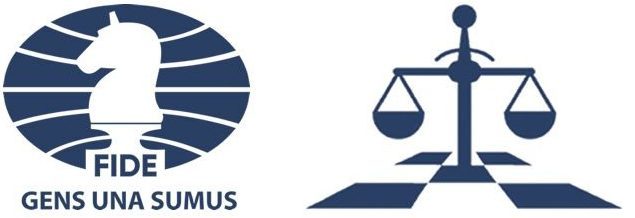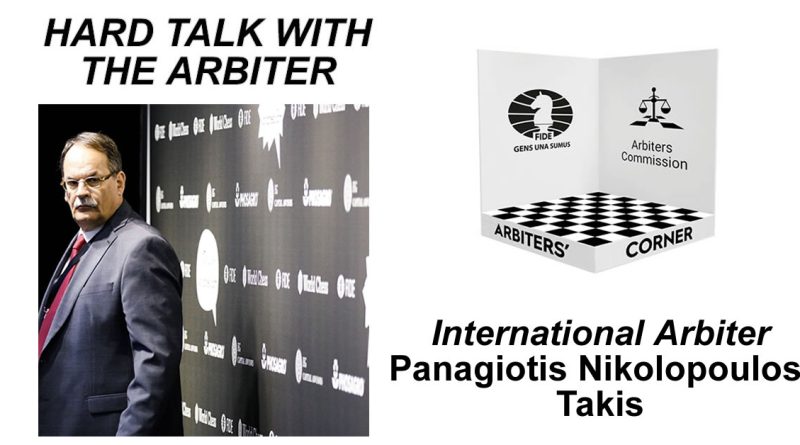HARD TALK WITH THE ARBITER – IA PANAGIOTIS NIKOLOPOULOS – TAKIS
Hard Talk with the Arbiter will now be a fortnightly article sharing experiences with arbiters. In this article, we will feature IA Takis Nikolopoulos, the fameous arbiter and he was Chairman of the FIDE Arbiter’s Commission for 20 years. The next article to be published in two weeks will feature a female IA.
1. Tell me about yourself?
My name is Takis (short for Panagiotis) Nikolopoulos. I am 66 years old and I live in the city of Athens, Greece.
My profession is civil engineering and I work in the Greek Air Force, in the Airport of Tatoi, close to Athens. Over the years, I’ve contributed to many projects,
ranging from constructing buildings for personnel to designing pavements and shelters for aircrafts. It’s a rewarding career that has allowed me to make important
contributions to the infrastructure supporting our air force.
However, my passion extends beyond engineering.
I’ve dedicated a significant part of my life to chess and chess arbitration, serving as a Chess Arbiter and FIDE Lecturer. In 1993 I got the title of International Chess Arbiter from the World Chess Federation and since then I’ve served as Chief Arbiter in a great number of tournaments. I’ve been Chief Arbiter in three World Chess Olympiads and in six matches for the World Championship, both for men and women. Additionally, I’ve been Chief Arbiter in numerous world championships of all age categories (cadets, youth, juniors, adults, seniors) and in many international tournaments.
For two decades, from 1998 to 2018, I had the privilege of chairing the Arbiters’ Commission of FIDE and I continued as the Honorary Chairman until 2022.
As a FIDE Lecturer, I’ve had the pleasure of sharing my knowledge and experiences with aspiring arbiters worldwide, giving a great number of Arbiters’ Seminars all over the world.
I also have the title of FIDE Instructor.
I am the Tournament Director and Rating Officer of the Greek Chess Federation and I am a member of its Board since 1992.
Outside of the chessboard, I’m a family man. I’m happily married; I have two sons and recently became a grandfather, an experience that brings immense joy to my life. My interests span from reading and traveling to enjoying music.
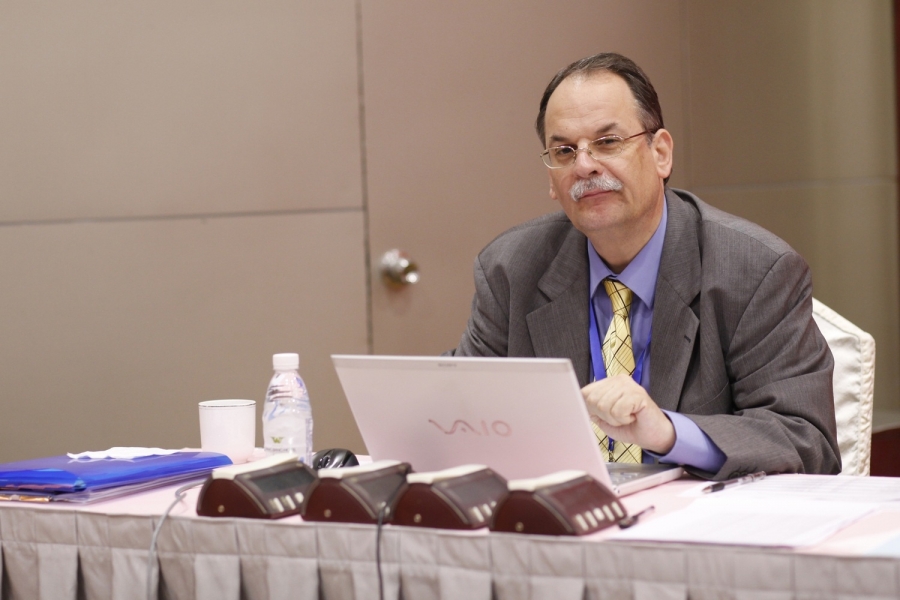
2. What is your greatest strength as an Arbiter?
As an Arbiter, I believe that my greatest strength has to do with my extensive experience and understanding of the intricacies of chess tournaments. Over the years, I’ve had the privilege of serving as the Chief Arbiter in numerous events, including three World Chess Olympiads, six matches for the World Championships and various World Chess Championships across different age categories. This big experience together with being in the lead of the FIDE Arbiters’ Commission for two decades, has equipped me with a keen eye for detail and a comprehensive knowledge of the rules and regulations that govern the game and strengthened my ability to handle complex situations with calm and precision and provide fair and consistent rulings. My commitment to upholding the spirit of fair play and ensuring an appropriate playing environment has been a guiding principle throughout my tenure.
Additionally, my role as a FIDE Lecturer has allowed me to share my knowledge with aspiring Arbiters worldwide through seminars. This commitment to education and continuous improvement not only benefits me personally but also contributes to the overall growth and professionalism of the global chess community.
I also believe that effective communication is absolutely necessary in the role of an Arbiter. My experience has taught me to communicate clearly and diplomatically with players, organizers, and colleagues-arbiters. This skill not only helps to prevent and resolve conflicts but also contributes to maintaining a positive and fair playing environment.
Attention to detail is another strength I consider that I have. In the world of chess, where rules and regulations are crucial, I make it a point to ensure that every aspect of a tournament is meticulously followed and executed. This commitment to detail is essential for upholding the integrity of the game and ensuring equal playing environment for all participants.
Furthermore, my role as Chairman of the FIDE Arbiters’ Commission for two decades has provided me with a unique perspective on the global chess community. This exposure has equipped me with insights into various chess cultures, allowing me to approach arbitration with a broad and inclusive mindset.
In essence, my greatest strength as an Arbiter lies in the combination of my experience, effective communication, attention to detail, and a deep commitment to the principles of fairness and integrity in chess.
3. How would your colleagues describe you?
If I were to speculate on how my colleagues might describe me, I believe they would highlight several key qualities:
Experienced and Knowledgeable:
My colleagues would likely describe me as someone with extensive experience and deep knowledge, especially in the field of chess arbitration. My long tenure as a Chief Arbiter and my role in the FIDE Arbiters’ Commission would underline this aspect.
Diplomatic and Approachable:
Given the nature of arbitrating and working in chess events, my colleagues might describe me as diplomatic and approachable. Handling disputes and maintaining a positive atmosphere are crucial, and being approachable facilitates effective communication.
Decisive Under Pressure:
In the fast-paced environment of chess tournaments, making timely and accurate decisions is essential. My colleagues would likely acknowledge my ability to remain decisive under pressure, ensuring the smooth flow of events.
Team Player and Leader:
As a Chief Arbiter, collaboration with arbiters and tournament staff is vital. My colleagues might describe me as a team player, willing to contribute to the collective success of the team. Additionally they might recognize my skills in leading and coordinating a team effectively.
Committed to Education:
Given my role as a FIDE Lecturer, my colleagues may see me as someone committed to the educational aspect of chess arbitration. This could include conducting seminars and sharing knowledge with colleague-arbiters, contributing to the overall growth of the community.
Multicultural Sensitivity:
Working in international chess events exposes one to a diverse range of cultures. My colleagues might note my ability to navigate and appreciate this diversity, fostering an inclusive and respectful working environment.
Passionate and Dedicated:
My colleagues might describe me as passionate about chess and dedicated to the success of the events I’m involved in. This dedication extends to the continuous improvement of arbitration standards and the promotion of fair play.
Of course, individual perceptions may vary, but I believe these qualities would likely be mentioned by colleagues when describing my professional persona.
4. Where do you see your career in the next five years?
While I can’t predict the future with certainty, I envision my career continuing to evolve and contribute to the world of chess arbitration over the next five years. A few aspects for my potential career in future are:
Continued Involvement in Major Tournaments:
I anticipate remaining actively engaged in major international chess tournaments, perhaps taking on the role of Chief Arbiter in important and prestigious events. The experience gained from these high-profile competitions allows me to contribute to the global chess community and further refine my skills.
Educational Initiatives:
Building on my role as a FIDE Lecturer, I hope to continue contributing to the education and training of chess arbiters worldwide. This may involve conducting more seminars, workshops, refreshing courses and training sessions, to share knowledge and promote professional development within the community.
Innovations in Chess Arbitration:
I aspire to be at the forefront of innovations in chess arbitration, staying on top of changes in rules and regulations. Embracing technological advancements and contributing to the modernization of arbitration processes could be an exciting aspect of my future endeavors.
Mentorship and Leadership:
Given my great experience, I might take on mentorship roles, guiding the next generation of arbiters which brings me immense pleasure and joy. Additionally, continuing to provide leadership within the chess arbitration community, whether through organizational roles or advisory positions, could be part of my future contributions.
Global Collaborations:
Strengthening collaborations with chess organizations, federations, and colleagues arbiters on a global scale is a goal. This involves working towards standardizing arbitration practices, promoting fair play, and promoting a sense of unity within the international chess community.
Personal and Professional Balance:
Striking a balance between my professional commitments and personal life remains a priority. As I would like to continue to contribute to the chess world, I also want to ensure that I have time for my family, travel, and personal interests.
While specific opportunities may unfold over time, I am committed to the continued growth and positive impact of chess arbitration. Flexibility and adaptability will be key, while being in the chess world in the coming years. Of course a lot depends on FIDE and the FIDE Arbiters’ Commission, if they would like to use my skills in the above mentioned areas.
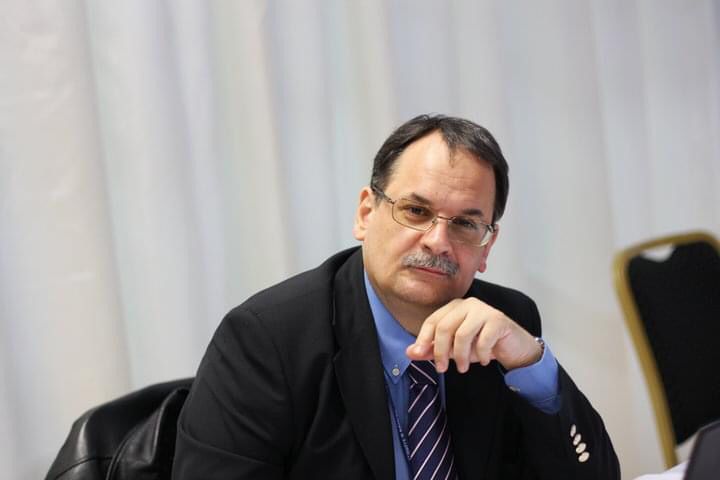
5. What have been your weaknesses as an arbiter?
During my journey as an Arbiter, I acknowledge that, like anyone, I have encountered challenges and areas for improvement. It’s essential to recognize and address weaknesses to grow and enhance one’s capabilities. Some of the aspects I consider as areas where I think I could improve are:
Balancing Strict Adherence to Rules with Empathy:
In the pursuit of maintaining the integrity of the game, there were instances where I might have been perceived as overly focused on strict adherence to the rules. While consistency and fairness are absolutely necessary, I recognize the importance of incorporating empathy and understanding in certain situations. Finding a balance between upholding the regulations and considering the unique
circumstances of players can be challenging but is crucial for creating a positive tournament atmosphere.
Enhancing Technological Proficiency:
The chess world is continually evolving, with technology playing an increasingly significant role. Embracing and fully leveraging technological advancements in chess arbitration is an area where I see room for improvement. This includes staying updated on the latest software, tools, and platforms that can enhance the efficiency of tournament operations.
Ensuring Clear Communication:
Effective communication is vital in arbitration, and there may have been instances where I could have improved in conveying decisions or information more clearly. Striving for clarity and transparency is an ongoing effort, ensuring that players and all involving parts have a comprehensive understanding of the logic behind arbitral decisions.
Acknowledging these areas for improvement is a crucial step in personal and professional development. I am committed to learning from these experiences, seeking feedback, and continuously refining my skills as an Arbiter to contribute positively to the chess community.
It’s essential to recognize and address weaknesses to grow and enhance one’s capabilities.
Areas for improvement
6. What’s your management style as a Chief Arbiter?
As a Chief Arbiter, my management style is characterized by a combination of leadership, collaboration, and a commitment to maintaining a fair and positive tournament environment. The key elements that define my approach are:
Clear Communication:
I give priority to clear and transparent communication with all the parties, including players, colleagues arbiters, tournament staff, and organizers. Providing timely and comprehensive information ensures that everyone is well-informed and contributes to a smooth operation.
Approachability:
I try to create an atmosphere where participants feel comfortable approaching me with concerns or questions. Being approachable fosters open communication, allowing for the resolution of issues before they escalate.
Fairness and Consistency:
Upholding fairness and consistency in the application of rules is fundamental. I ensure that decisions are made objectively and without bias, treating all participants equitably. Consistency in enforcement builds trust and credibility within the chess community.
Team Collaboration:
Collaborating with colleagues arbiters is essential for the success of any tournament. I encourage a team-oriented approach, valuing the diverse skills and perspectives each member brings. This includes delegating responsibilities effectively and promoting a supportive team dynamic.
Crisis Management:
In high-pressure situations or crises, I maintain a calm and composed behavior. I assess situations thoroughly, involve the necessary parties in decision making, and work towards resolution while reducing potential disruptions in the tournament.
Adaptability:
The chess environment can be dynamic and unforeseen challenges may arise. I approach these situations with flexibility, adapting strategies and plans as needed to ensure the tournament’s continued success.
Educational Leadership:
I view my role as an opportunity to educate and mentor, both within the arbiter team and among the participants. Conducting pre-tournament meetings, providing clarifications on rules and sharing insights contribute to the overall education and understanding of the chess community.
Strategic Planning:
Before and during the tournament, I engage in strategic planning to deal with potential issues and streamline operations. This includes coordinating logistics, addressing potential rule ambiguities, and implementing measures to enhance the overall efficiency of the tournament.
In essence, my management style as a Chief Arbiter is based on effective communication, fairness, collaboration, crisis management, adaptability, educational leadership, and strategic planning. These elements work together to create an environment where chess tournaments can run smoothly and participants can focus on the game itself.
Takis Nikolopoulos
7. What is it about this position as Chief Arbiter that attracts you most?
The position of Chief Arbiter holds a special appeal for me due to several compelling aspects that resonate with my passion for chess and my commitment to promote fair play and sportsmanship within the chess community.
Leadership and Responsibility:
Serving as a Chief Arbiter allows me to take on a leadership role in running and overseeing chess tournaments. The responsibility that comes with managing the intricacies of such events, making crucial decisions, and ensuring the adherence to rules aligns with my dedication to upholding the highest standards in chess competition.
Contributing to the Chess Community:
Being a Chief Arbiter provides a unique opportunity to contribute significantly to the growth and development of the global chess community. Through effective management and fair arbitration, the Chief Arbiter can play a pivotal role in creating a positive and enriching environment for players, arbiters, and all involved participants and become a role model, at the same time being always ready to share
the same responsibilities with all the team, starting from collecting scoresheets and doing any type of a job.
Championing Fair Play:
The Chief Arbiter plays a crucial role in maintaining fairness and integrity throughout a tournament. This aligns with my core values, and the opportunity to apply the fair play and uphold the principles of the game is a compelling aspect of the position.
Educational Impact:
The role allows me to contribute to the education of both players and colleagues arbiters. Clarifying rules and sharing insights contribute to the continuous learning and improvement within the chess community, promoting a culture of knowledge exchange.
Navigating Challenges:
Chess tournaments can be dynamic and challenging, presenting various scenarios that require quick and effective decision-making. The excitement of navigating these challenges, ensuring a smooth tournament flow, and resolving issues as they arise, appeals to my problem-solving nature.
Global Engagement:
The international nature of chess tournaments provides the opportunity for global engagement. Serving as a Chief Arbiter means interacting with participants from diverse cultures and backgrounds and contributes to the global chess community.
Promoting Sportsmanship:
Beyond the technical aspects of chess, the Chief Arbiter plays a role in promoting sportsmanship and a positive playing atmosphere. Ensuring a sense of respect and solidarity among participants adds an important dimension to the position.
Staying Connected to the Game:
As a chess enthusiast, the position allows me to stay closely connected to the game I love. It provides a front-row seat to the excitement and strategic brilliance of top-level chess competitions.
In summary, the multifaceted nature of the Chief Arbiter’s position, enclosing leadership, responsibility, educational impact, fair play advocacy, and global engagement, make it a role that deeply resonates with my professional and personal values within the chess community.
Takis Nikolopoulos
8. How do you handle your anger?
Handling anger is a crucial aspect of maintaining professionalism and effective communication, especially in roles that involve leadership and arbitration. My ways to manage anger are:
Pause and Reflect:
When confronted with a situation that triggers anger, I make a conscious effort to pause before reacting. Taking a moment to collect my thoughts and reflect on the situation helps me respond more thoughtfully rather than reacting impulsively.
Communication Delay:
If possible, I may delay communication until I am in a more composed state. This prevents the risk of saying or doing something in the heat of the moment that I might later regret.
Seeking Understanding:
I try to understand the root cause of my anger. Is it related to a specific incident, a pattern of behavior, or external stressing factors? Identifying the source helps in addressing the underlying issues rather than merely reacting to the surface triggers.
Constructive Expression:
When it’s necessary to express frustration or disagreement, I aim to do so constructively. I choose my words carefully, focusing on the specific behavior or situation rather than making personal attacks. This promotes a more positive and solution-oriented conversation.
Conflict Resolution Skills:
I draw on conflict resolution skills to address the source of the anger. This may involve engaging in open dialogue, seeking compromise, and working towards a resolution that is fair and satisfactory for all parties involved.
Personal Time-Out:
If the situation allows, I might take a short break or step away from the immediate environment. This brief time-out provides an opportunity to cool down and regain perspective before addressing the issue.
Learn and Adapt:
Reflecting on instances where anger was a factor, I strive to learn from each experience. Understanding triggers and patterns helps in developing strategies to prevent or manage anger more effectively in the future.
Professional Support:
If anger management becomes a recurring challenge, seeking professional support, such as counseling or coaching, can provide additional tools and strategies to address the underlying issues.
Overall, my approach to handling anger is centered on self-awareness, self regulation, and proactive strategies to maintain a composed and professional behavior, especially in roles where effective communication and conflict resolution are essential.
9. Are you are a “PEOPLES” person? (Peoples meaning administrators, fellow arbiters, players etc.)
Yes, I would consider myself a “peoples” person. I enjoy interacting with others, whether it’s in a professional or personal setting. In the context of my role as a Chess Arbiter, effective communication and interpersonal skills are very important. I believe in creating positive relationships with players, colleagues arbiters, tournament staff and organizers, in order to create a harmonious and enjoyable
chess environment.
My approachability, willingness to listen, and diplomatic behavior contribute to my ability to connect with people from various backgrounds. Whether working with colleagues in the chess community, leading a team of arbiters, or engaging with participants in tournaments, I try to create a supportive and inclusive atmosphere.
In addition to my professional interactions, I also value personal connections. Being a family man and enjoying activities like reading, traveling, and music, I find common ground with others and appreciate the richness that interpersonal relationships bring to both work and life. Overall, I believe that being a “peoples” person is an asset in building strong collaborations and contributing positively to any
community or team.
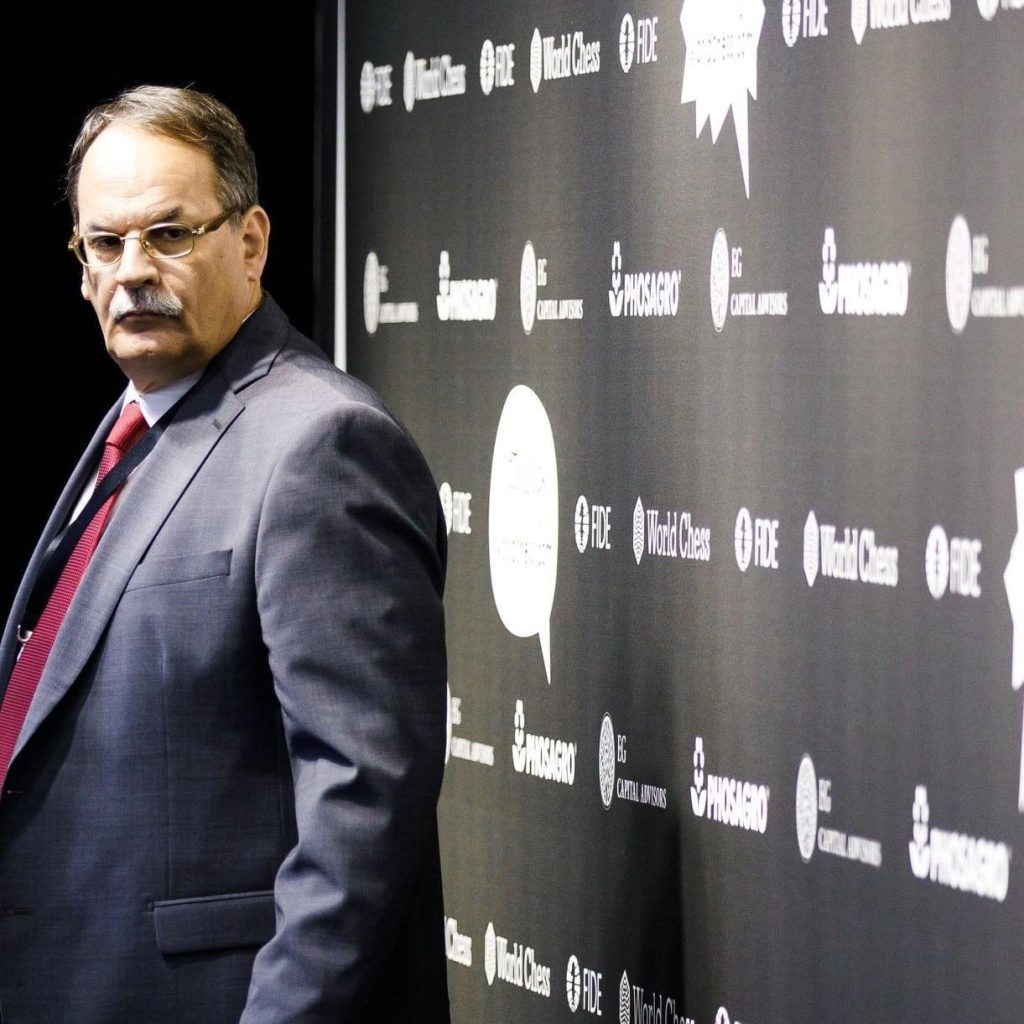
10. What are your personal skills which makes you a candidate as a Chief Arbiter?
As a candidate for the position of Chief Arbiter, several personal skills contribute to my suitability for the role:
Extensive Knowledge of Chess Rules and Regulations:
My deep understanding of the rules and regulations governing chess, acquired through years of experience as an Arbiter and Chairman of the FIDE Arbiters’ Commission, put me as a candidate with a strong foundation in the technical aspects of the game.
Effective Communication:
Clear and comprehensive communication is crucial in a Chief Arbiter role. My ability to convey complex information in a straightforward manner, both to players and tournament staff, ensures a smooth and well-coordinated event.
Decision-Making under Pressure:
Chess tournaments can be intense, and decisions must be made swiftly and accurately. My experience as Chief Arbiter in very important competitions, including World Chess Olympiads and World Championships, has strengthened my ability to make sound judgments under pressure.
Diplomacy and Conflict Resolution:
Arbitrating requires a delicate balance between enforcing rules and maintaining a positive playing atmosphere. My diplomatic approach and skill in resolving conflicts contribute to ensuring a fair and sportsmanlike environment during tournaments.
Organizational Skills:
Successfully managing large-scale chess events demands strong organizational skills. From coordinating logistics to overseeing the tournament schedule, my ability to plan and execute ensures the efficient operation of chess competitions.
Continuous Learning and Adaptability:
The chess world evolves and staying on top of changes is necessary. My commitment to continuous learning, exemplified through FIDE Lectures and engagement in global chess events, reflects my adaptability and dedication to staying current in the field.
Multicultural Sensitivity:
Having conducted tournaments worldwide, I have an appreciation for the diverse cultures and backgrounds of participants. This sensitivity contributes to creating an inclusive and welcoming atmosphere for players from different regions.
Team Leadership:
Leading a team of arbiters requires strong leadership skills. My experience in overseeing arbiters in various capacities, coupled with my ability to inspire and motivate, makes me to effectively lead and coordinate a team for successful tournament execution.
In summary, my candidacy as Chief Arbiter is supported by a combination of technical expertise, effective communication, decision-making under pressure, diplomatic skills, organizational proficiency, a commitment to continuous learning, multicultural sensitivity, and strong team leadership capabilities.
Takis Nikolopoulos
11. How do you deal with pressure or stressful situations?
Managing pressure and stressful situations in chess tournaments, especially in the role of a Chief Arbiter, requires a combination of strategic thinking, emotional intelligence, and effective communication. Here’s how I typically handle pressure in the context of chess tournaments:
Preparation and planning:
Thorough preparation before the tournament is crucial. This includes reviewing tournament regulations, anticipating potential issues, and having contingency plans in place. Adequate planning helps in reducing uncertainty and stress.
Stay calm and focused:
Maintaining a calm and focused mindset is essential. Despite the intensity of the competition or any unexpected challenges, I try to keep a clear mind. This composure not only helps me make clearer decisions but also sets a positive tone for the tournament environment.
Effective communication:
Clear and timely communication with players, arbiters, tournament staff and organizersis key. Transparency about procedures, rulings, and any changes helps manage expectations and minimizes misunderstandings that could contribute to stress.
Decisiveness under pressure:
In moments of great intensity, the ability to make decisive decisions is crucial. I draw on my experience and knowledge of chess rules to make swift and fair judgments, ensuring the tournament’s integrity is upheld.
Delegate Responsibilities:
Recognizing when to delegate tasks and collaborating with a competent team of arbiters and staff are essential. Distributing responsibilities ensures that the workload is shared, and everyone can contribute to the overall success of the tournament.
Giving attention on Fair Play:
Emphasizing the importance of fair play and sportsmanship helps set the tone for the tournament. Encouraging a positive and respectful atmosphere among players and arbiters contributes to a more enjoyable and less stressful environment.
Adaptability and Flexibility:
Chess tournaments can be dynamic, and unexpected situations may arise. Being adaptable and flexible in adjusting plans or procedures when necessary, helps handling challenges effectively.
Time Management:
Efficient time management is essential in high-pressure situations. Setting realistic timelines, allocating resources effectively, and staying on schedule contribute to a smoother workflow and ensure that critical aspects are addressed promptly.
Learn from Challenges:
Every tournament presents unique challenges. Instead of viewing challenges as setbacks, I see them as opportunities for learning and improvement. Reflecting on each situation helps me refine my approach for future tournaments.
By combining these strategies, I aim to handle pressure and stressful situations in chess tournaments effectively, ensuring that the focus remains on facilitating a successful and fair chess tournament experience for all participants.
Managing pressure and stressful situations in chess tournaments, especially in the role of a Chief Arbiter, requires a combination of strategic thinking, emotional intelligence, and effective communication.
Takis Nikolopoulos
12. How would the current ARB Commission Chairman Ivan Syrovy describe you for your works you have done for ARB Commission?
I suppose this is a question for Ivan!
I know Ivan since many years, as he was member of the FIDE Arbiters’ Commission for many years, when I was the Chairman.
He took part actively in the work of the Commission and especially when we created the Disciplinary Regulations for the Arbiters, as he participated in the Disciplinary Subcommittee we established, bringing his legal expertise to the table.
Based on discussions we have made all these years I believe that Ivan would consider me as a respected and accomplished figure within the FIDE Arbiters’ Commission and consider my leadership in the Commission as positive, describe me as a dedicated and very hardworking Chairman of the Commission and a very experienced Chess Arbiter and FIDE Lecturer, who has contributed a lot in every field of the Chess Arbitration.
He knows that I am ready to help the Commission in anything I would be asked.
I am sure that he will continue and improve the work of the Commission very successfully, with the help of all the members of the Commission.
13. What would you like to be improved in the ARB Commission that you didn’t improve upon during your tenure as Chairperson of ARB Commission?
As the former Chairman of the FIDE Arbiters’ Commission, it’s essential to recognize that no tenure is without challenges, and there might always be areas for improvement. Reflecting on my past role, I would express a desire for continuous enhancement in the following areas:
Technological Integration:
The rapid evolution of technology has a significant impact on chess tournaments and arbitration processes. Improving the commission’s integration of technology, such as digital platforms for communication, tournament management software, and online training resources, would enhance efficiency and keep the commission on top of technological advancements.
Global Outreach and Inclusivity:
While I have initiated efforts to promote educational programs for arbiters globally, there’s always room for improvement in ensuring inclusivity. Enhancing outreach to regions with emerging chess communities and addressing language barriers can further strengthen the global network of arbiters.
Youth Development Initiatives:
The future of chess relies on fostering the next generation of arbiters. Developing targeted programs and initiatives to engage and train young arbiters, perhaps in collaboration with youth-focused chess organizations, could contribute to a sustainable and vibrant future for chess arbitration.
Research and Innovation:
The commission could benefit from a continuous emphasis on research and innovation within the field of chess arbitration. Encouraging and supporting research projects related to arbitration methodologies, rule interpretations, and the impact of technology on arbitration could contribute to the commission’s tasks.
Collaboration with Chess Organizations:
Strengthening collaborative efforts with various chess organizations, both at the national and international levels, is important. Establishing partnerships that facilitate the exchange of knowledge, resources, and best practices can create a more cohesive and supportive global chess arbitration community.
Mentorship Programs:
Implementing mentorship programs for aspiring arbiters can be an effective way to pass on the wealth of experience within the commission. Pairing seasoned arbiters with newcomers could accelerate the learning curve and contribute to the professional development of emerging talents.
Enhanced Communication Strategies:
While communication strategies may have been in place, continuous improvement in communication is essential. Exploring innovative ways to disseminate information, updates and educational content to arbiters globally, considering various communication channels, can further enhance the commission’s
reach and impact.
In summary, the acknowledgment of areas for improvement includes technological integration, global outreach, youth development, research and innovation, collaboration with chess organizations, mentorship programs, and enhanced communication strategies. These areas aim to ensure the ongoing growth, inclusivity, and relevance of the Arbiters’ Commission in the world of chess arbitration.
Takis Nikolopoulos
14. What has been your most difficult situation since you became an arbiter?
Reflecting on my extensive experience as a Chief Arbiter, one of the most challenging situations I faced occurred during a prestigious international chess tournament. The difficulty was caused from a complex dispute involving two prominent players, which not only threatened to disrupt the tournament but also had the potential to create broader repercussions.
The dispute revolved around a controversial move during a critical match, leading to intense disagreements between the players. The tension escalated, and emotions ran high, creating a charged atmosphere not only on the chessboard but also among the spectators and tournament officials.
As the Chief Arbiter, I found myself in the center of this storm, tasked with resolving the dispute in a fair and impartial manner. The challenge lay not only in deciphering the technical aspects of the move but also in defusing the emotional elements that had expressed by the players in the situation. Maintaining the integrity of the tournament while ensuring that the players felt they were treated justly was
necessary.
To address this complex scenario, I employed a combination of clear communication, diplomacy, and a very detailed examination of the chess rules. I engaged in direct discussions with the players, allowing them to express their concerns while maintaining a neutral stance. Collaborating with colleagues arbiters
further enriched the decision-making process.
Ultimately, a resolution was reached that satisfied both players and preserved the integrity of the tournament. This experience reinforced the importance of maintaining composure under pressure, applying a thorough understanding of the rules, and upholding the principles of fair play in chess arbitration.
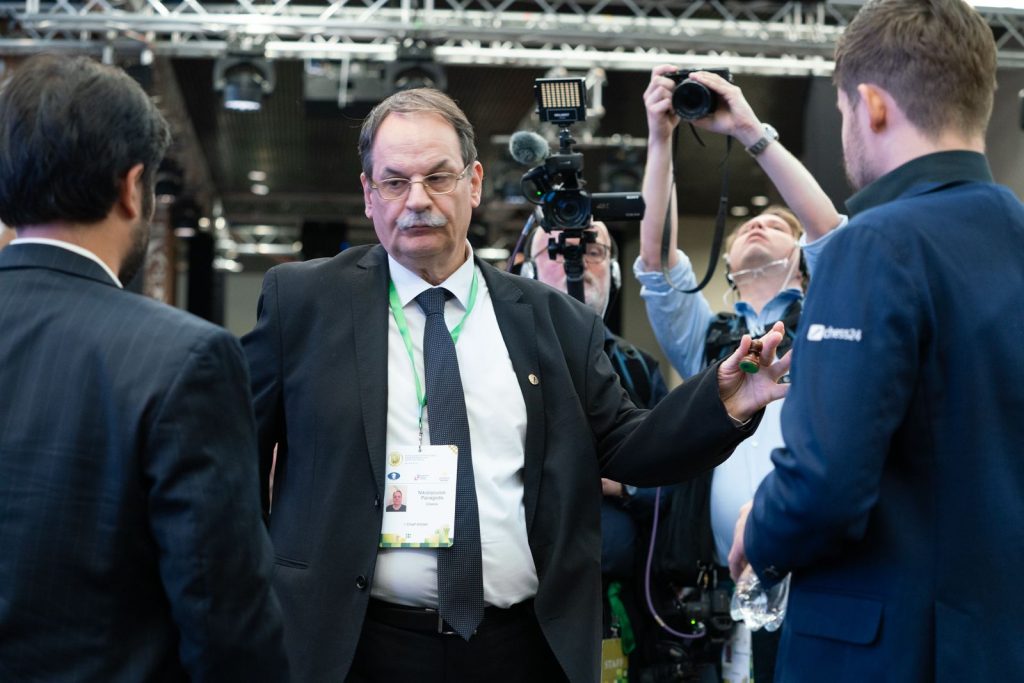
15. In conclusion, what problems as Chief Arbiter did you face in your last chess events and how did you solve them? At least give us three problems and solutions.
I’ll outline three common problems that Chief Arbiters might face during chess events and potential solutions:
1 Dispute over Rule Interpretation:
Problem:
In a recent chess event, a dispute arose between two players regarding a specific move and its legality. The players had differing interpretations of the rules, leading to tension and a potential disruption to the game.
Solution:
Immediate Assessment: I promptly approached the chessboard to assess the situation and understand the nature of the dispute.
Consultation with Colleagues: Engaging the on-site arbiters for their witnesses and consulting the tournament’s rules helped gather perspectives on the specific situation.
Clear Ruling and Explanation: After careful consideration, I provided a clear ruling based on the rules, explaining the decision to both players. Transparency and adherence to established guidelines helped resolve the dispute.
2. Technical Regulations Challenges:
Problem:
Unforeseen technical regulations’ challenges, such as a delay in starting rounds or issues with pairing systems, can disrupt the tournament schedule and create frustration among players.
Solution:
Proactive Planning: Anticipating potential technical regulations challenges, I established a comprehensive plan before the event, including contingency measures for possible disruptions.
Clear Communication: Transparent communication with players and staff regarding any delays or issues kept everyone informed and minimized frustration.
Efficient Problem Solving: Swift identification of the root cause and collaboration with the organizing team allowed for quick problem-solving and the implementation of necessary adjustments to maintain the schedule.
3. Behavioral Issues:
Problem:
In some instances, players may exhibit unsportsmanlike behavior, such as disputes with opponents, verbal outbursts, or violating tournament etiquette.
Solution:
Immediate Intervention: Addressing behavioral issues promptly is crucial. I intervened immediately to prevent the escalation of conflicts and to maintain a positive playing environment.
Private Discussions: For more serious behavioral concerns, I conducted private discussions with the involved parties to understand the issues and provide guidance on appropriate conduct.
Enforcement of Disciplinary Measures: In cases where repeated warnings or discussions did not resolve the behavioral issues, I enforced disciplinary measures outlined in the tournament regulations to ensure fair consequences and maintain the integrity of the event.
These solutions highlight the importance of proactive planning, effective communication, collaboration with arbiters, and a commitment to fair and transparent decision-making in resolving common problems faced by Chief Arbiters during chess events.
These solutions highlight the importance of proactive planning, effective communication, collaboration with arbiters, and a commitment to fair and transparent decision-making in resolving common problems faced by Chief Arbiters during chess events.
Takis Nikolopoulos
Prepared by IA Chanda Nsakanya
